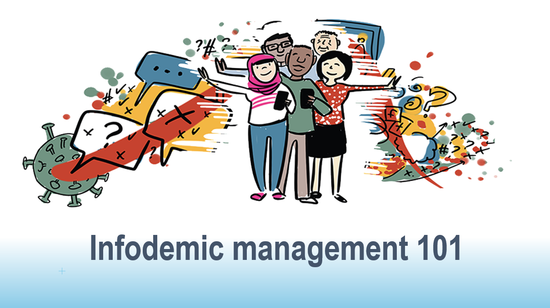
Everyone has a role in managing the infodemic, and this journey starts by understanding and identifying its key mechanisms and actors. This course is for anyone interested in understanding what an infodemic is, how it dramatically affects public health and what we can do about it now and into the future. Participants can expect to be exposed to a broad range of infodemic management skills and topics and learn the basics on how to decrease the negative impact of misinformation and disinformation on public health.
Please note: These materials were launched on 14/12/2021.
Language: English
COVID-19
Course information
This course is also available in the following languages:
Overview: The COVID-19 pandemic has impacted everyone around the globe and will continue to do so for the foreseeable future. Strengthening the public health response, health systems, and global health security depends on improving management of our entire information ecosystem to get people the right health information, in the right format, from the right messenger, and at the right time to promote healthy behaviors and resilience to health misinformation. The rapid overflow of information, combined with information voids and confusing messaging, have all together created an "infodemic" that is making it hard for people to find trusted information and know what actions to take to protect their health and their communities. This confusion leads to risk-taking behaviours and is eroding social cohesion and trust in expertise, health responders, epidemic mitigation strategies and health authorities - prolonging the pandemic.
The course comprises an introduction, five modules and three skills lab covering an overview of the COVID-19 infodemic that we’re all facing, strategies and tools to navigate through it, expose tactics employed by malicious actors in the infodemic, and support friends and family with building resilience against misinformation and disinformation.
Learning objective: By the end of this course, you should be able to:
- Describe what an infodemic is
- Describe how an infodemic affects public health
- Describe why we all have a role to play in managing infodemics
- Understand and identify misinformation, disinformation and malinformation
- Identify tactics employed by malicious actors to create misleading information
- Analyse the nature, origins and spread of misinformation
- Verify health information and visual content online
- Identify effective pre- and debunking methods and amplify credible health information
- Use free tools for social listening to identify information voids
- Apply tips and tools to boost resilience to mis- and disinformation among friends and family
- Identify effective ways to ensure likely uptake of messages/behaviours
Course duration: Approximately 4 hours.
Certificates: A Certificate of Achievement will be available to participants who score at least 80% of the total points available in the final assessment. Participants who receive a Certificate of Achievement can also download an Open Badge for this course. Click here to learn how.
Should you be interested in learning more about other aspects of infodemic management, please refer to the remaining modules of this course series:
- Infodemic Management: Addressing health misinformation
Infodemic Management: Developing an infodemic insights report
Infodemic Management: Social marketing and message testing methods
Infodemic Management: Defining a taxonomy for social listening
Infodemic Management: Using human-centered design good practices
Infodemic Management: Working effectively as an infodemic manager in the field
Course contents
Introduction to the course:
By the end of this module, you should be able to: explain why the course was created, what are its learning objectives, and how it is organised.Module 1: Introduction to infodemic management:
By the end of this module, you should be able to: explain what an infodemic is and why we should care; and describe why we all have a role to play in managing infodemics.Module 2: Introduction to the science of misinformation:
By the end of this module, you should be able to: demonstrate the difference between misinformation and disinformation, identify some of the most common strategies used to spread false and misleading information; recall some of the most frequent fallacies used in COVID-19 news.Module 3: Verification and fact checking in a health crisis:
By the end of this module, you should be able to: describe what is factchecking and who are its main actors and tools; identify misleading and verify visual content onlineModule 4: Prebunking, debunking and inoculation theory:
By the end of this module, you should be able to: explain prebunking and debunking concepts; identify some prebunking and debunking techniques; describe what is the inoculation concept; and list technics to amplify credible health information.Module 5: Interventions’ design and empowerment of communities:
By the end of this module, you should be able to: assess the impact of misinformation on trust, risk perception, behaviors, and cognition; identify some practical ways to ensure likely uptake of messages and behaviors in communities; describe methods to design multiple levels’ interventions based on specific knowledge or behavior objectives; and describe the role that community engagement can play in responding to public health crises.Final Quiz
Enroll me for this course
Certificate Requirements
- Gain a Record of Achievement by earning at least 80% of the maximum number of points from all graded assignments.
- Gain an Open Badge by completing the course.